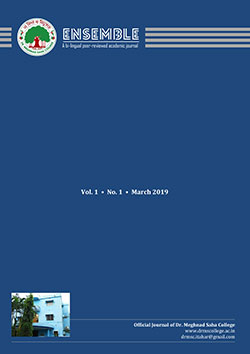Anti-Indian factions in Bangladeshi Politics (1971 – 2014): A Brief Survey
Abstract
India played an active role in the liberation war of Bangladesh in 1971. The relation between the two countries remained cordial in the initial years but it soon soured with the coup d’etat of 1975. This also marked the rise of the anti-Indian elements in the Bangladeshi politics. This article makes a brief survey of anti- Indian elements that has remained a part and parcel of the political fabric of Bangladesh since 1971. It also looks into the ways in which the anti-India stance has been instrumental in garnering popular support to hold on to political power.
The article begins with the background of the creation of Bangladesh and India’s active role in it which was followed by the friendship treaty signed between the two countries. Then it moves to the changing scenario following the coup d’état of 1975 which marked the visible changes within the polity of Bangladesh. The nature of nationalism underwent change moving from secularism to a religious character which found expression in the policies of the state. The military rule most often found it convenient to use the anti-Indian stance in order to please the fundamentalist elements of the country in its bid to garner popular support. The issues of water sharing, refugees and issues of fomenting possible insurgency with active support of India were highlighted. Even after the restoration of democracy, the anti-Indian factions remained active in opposing the government of Sheikh Hasina’s foreign policy with regard to India. Radical religious factions, who had throughout opposed the liberation war,still play a major role in fanning the anti-Indian sentiments in Bangladeshi politics.
Keywords: South Asia,Islam, Radicalism, Secularism, Democracy
https://doi.org/10.37948/ensemble-2020-0202-a013
Views: 1864



